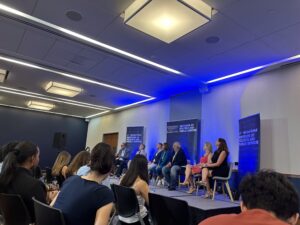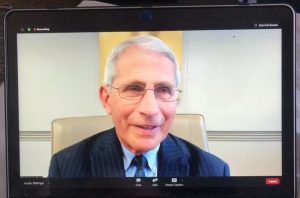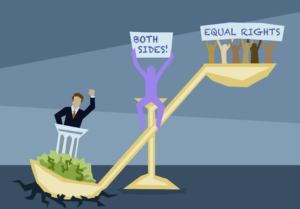As the United States enters its first days of a new presidential administration, Americans are wary of the country’s deep divisions but hopeful about its political future, a recent report from Georgetown’s Institute of Politics and Public Service, or GU Politics, finds.
Pollsters Republican Ed Goeas and Democratic Celinda Lake collaborated to produce a civility poll, drawing data from 800 likely voters over four days. Results painted a picture of deep political divides along partisan lines and a dire assessment of the national political dialogue, but voters also found reasons to suggest a more civil and united future.
Data collection on the topic began two years ago as a section of the institute’s national bipartisan battleground poll. The battleground poll, now housed at Georgetown, measures political opinion among registered voters and has been a nationally recognized indicator since it began in 1991.
The 2021 polling was inadvertently split evenly before and after the Capitol riot on Jan. 6, reflecting a critical moment in American politics and serving as a timely reminder of the extremities of the national discourse.
The riot altered responses on specific questions, with an increase in the number of respondents who saw white supremacist groups as a major threat but did not have an outsized effect on the pool of data overall.
“The scenes at the US Capitol made me angry and broke my heart,” Mo Elleithee (SFS’94), executive director of the institute and former political strategist, wrote in a press release. “But they did not shake my faith in politics. It looks like many Americans are trying to keep the faith, too.”
Respondents were conscious of the conditions building to that display of violence, with 72 percent of polled voters saying that politics has become less civil under former president Donald Trump. “Leadership matters, and clearly Trump has been catalytic to incivility and division,” Lake said. The former president’s actions have put the country in a precarious state, according to the report, entrenching tribal instincts between supporters of the two major parties.
The overall assessment of political division in the country was an average of 76 out of 100, where 100 indicates “political division on the edge of a civil war.” Citizens taking up arms to storm the Capitol building and stall Biden’s election certification made the poll’s assessment of the deep political polarization even more concrete.
Voters saw culprits for the polarization in many places, especially politicians. Other actors responsible for the increase of bad behavior in politics included special interest groups, media outlets and social media platforms. Respondents especially blamed the latter, with 66 percent of respondents assigning high responsibility to social media platforms for the current fractured discourse—a marked increase from their early 2019 assessment of 51 percent.
Voter mindsets themselves also contribute to political division. According to Lake, “Voters hold mutually contradictory views and usually deeply resent having that pointed out to them.” For example, 88 percent of respondents agreed on the value of compromise and common ground as noble goals, but at the same time, 87 percent said they were tired of politicians who did not fight for their ideals and stand up to the other side.
Despite the high perceived incivility, voter expectations for a year from now show an improvement in national political civility of nearly eleven points, from 76 to 65 on the same scale.
“What surprised me was voter optimism. People think it’s about as bad as it’s ever been—the polarization, the lack of civility—but there’s a significant amount of cautious optimism,” Elleithee said.
The improvement is partially due to predictions about the Biden administration’s effectiveness. The poll found 92 percent of voters want the new president and Congress to work together, and a majority of respondents believe the cooperative effort will succeed in solving pressing issues.
Biden’s messaging throughout his presidential campaign and in his inauguration speech relied heavily on a vision of unity and bipartisan progress. Both Goeas and Lake emphasized the close attention voters will pay to the first 100 days of the new administration, looking to see their cautious optimism fulfilled.
“One thing the voters saw in Biden, regardless of his position on the issues, was a good man who was driven by his faith and experiences that gave his faith strength,” Goeas said.





